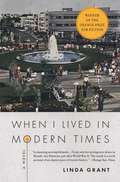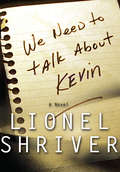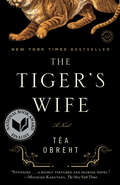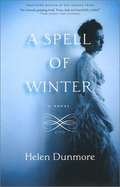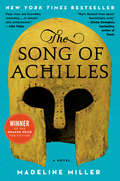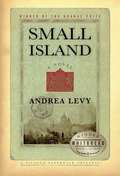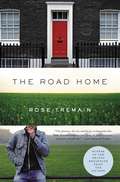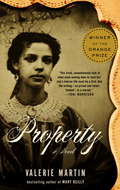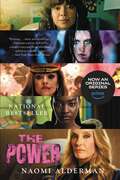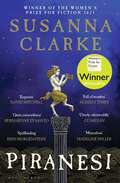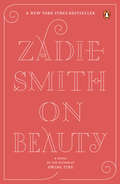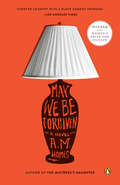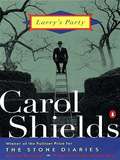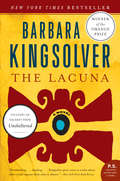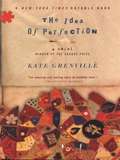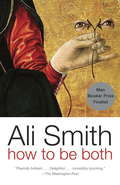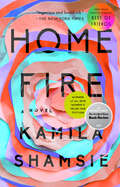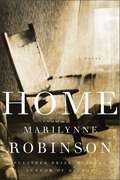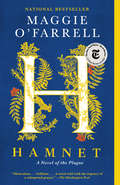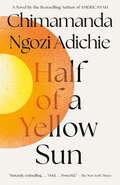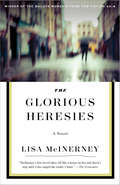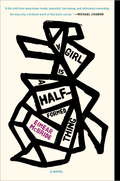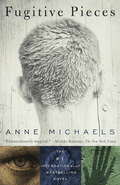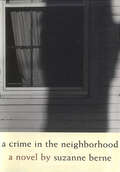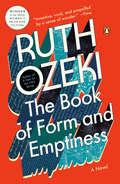Special Collections
Women's Prize for Fiction
Description: The Women's Prize for Fiction is awarded annually to a female author of any nationality for the best original full-length novel written in English. (Formerly known as the Orange Prize) #award
- Table View
- List View
When I Lived in Modern Times
by Linda GrantIn the spring of 1946, Evelyn Sert stands on the deck of a ship bound for Palestine. For the twenty-year-old from London, it is a time of adventure and change when all things seem possible.
Swept up in the spirited, chaotic churning of her new, strange country, she joins a kibbutz, then moves on to the teeming metropolis of Tel Aviv, to find her own home and a group of friends as eccentric and disparate as the city itself. She falls in love with a man who is not what he seems when she becomes an unwitting spy for a nation fighting to be born.
When I Lived in Modern Times is "an unsentimental coming-of-age story of both a country and a young immigrant . . . that provides an unforgettable glimpse of a time and place rarely observed" (Publishers Weekly, starred review).
Winner of the 2000 Orange Prize for Fiction
We Need to Talk About Kevin
by Lionel ShriverThat neither nature nor nurture bears exclusive responsibility for a child's character is self-evident.
But generalizations about genes are likely to provide cold comfort if it's your own child who just opened fire on his feellow algebra students and whose class photograph-with its unseemly grin-is shown on the evening news coast-to-coast.
If the question of who's to blame for teenage atrocity intrigues news-watching voyeurs, it tortures our narrator, Eva Khatchadourian.
Two years before the opening of the novel, her son, Kevin, murdered seven of his fellow high school students, a cafeteria worker, and the much-beloved teacher who had tried to befriend him.
Because his sixteenth birthday arrived two days after the killings, he received a lenient sentence and is currently in a prison for young offenders in upstate New York.
In relating the story of Kevin's upbringing, Eva addresses her estranged husband, Frank, through a series of startingly direct letters.
Fearing that her own shortcomings may have shaped what her son became, she confesses to a deep, long-standing ambivalence about both motherhood in general-and Kevin in particular.
How much is her fault?
We Need To Talk About Kevin offers no at explanations for why so many white, well-to-do adolescents-whether in Pearl, Paducah, Springfield, or Littleton-have gone nihilistically off the rails while growing up in the most prosperous country in history.
Instead, Lionel Shriver tells a compelling, absorbing, and resonant story with an explosive, haunting ending. She considers motherhood, marriage, family, career-while framing these horrifying tableaus of teenage carnage as metaphors for the larger tragedy of a country where everything works, nobody starves, and anything can be bought but a sense of purpose.
Winner of the 2005 Orange Prize for Fiction
The Tiger's Wife
by Tea ObrehtIn a Balkan country mending from war, Natalia, a young doctor, is compelled to unravel the mysterious circumstances surrounding her beloved grandfather's recent death.
Searching for clues, she turns to his worn copy of The Jungle Book and the stories he told her of his encounters over the years with "the deathless man." But most extraordinary of all is the story her grandfather never told her--the legend of the tiger's wife.
On the way to meet Natalia, he instead set off for a ramshackle settlement none of their family had ever heard of and died there alone. A famed physician, her grandfather must have known that he was too ill to travel.
Why he left home becomes a riddle Natalia is compelled to unravel. Grief struck and searching for clues to her grandfather's final state of mind, she turns to the stories he told her when she was a child.
On their weekly trips to the zoo he would read to her from a worn copy of Rudyard Kipling's The Jungle Book, which he carried with him everywhere; later, he told her stories of his own encounters over many years with "the deathless man," a vagabond who claimed to be immortal and appeared never to age.
But the most extraordinary story of all is the one her grandfather never told her, the one Natalia must discover for herself.
One winter during the Second World War, his childhood village was snowbound, cut off even from the encroaching German invaders but haunted by another, fierce presence: a tiger who comes ever closer under cover of darkness.
"These stories," Natalia comes to understand, "run like secret rivers through all the other stories" of her grandfather's life. And it is ultimately within these rich, luminous narratives that she will find the answer she is looking for.
Winner of the 2011 Orange Prize for Fiction
NATIONAL BOOK AWARD FINALIST
NEW YORK TIMES BESTSELLER
A Spell of Winter
by Helen DunmoreCathy and her brother, living with an aloof grandfather, make a passionate refuge for themselves against the terror of family secrets. On the brink of war, life becomes fraught with danger.
Winner of the 1996 Orange Prize for Fiction
The Song of Achilles
by Madeline Miller“At once a scholar’s homage to The Iliad and startlingly original work of art by an incredibly talented new novelist….A book I could not put down.”—Ann Patchett“Mary Renault lives again!” declares Emma Donoghue, author of Room, referring to The Song of Achilles, Madeline Miller’s thrilling, profoundly moving, and utterly unique retelling of the legend of Achilles and the Trojan War. A tale of gods, kings, immortal fame, and the human heart, The Song of Achilles is a dazzling literary feat that brilliantly reimagines Homer’s enduring masterwork, The Iliad. An action-packed adventure, an epic love story, a marvelously conceived and executed page-turner, Miller’s monumental debut novel has already earned resounding acclaim from some of contemporary fiction’s brightest lights—and fans of Mary Renault, Bernard Cornwell, Steven Pressfield, and Colleen McCullough’s Masters of Rome series will delight in this unforgettable journey back to ancient Greece in the Age of Heroes.
Small Island
by Andrea LevyHortense Joseph arrives in London from Jamaica in 1948 with her life in her suitcase, her heart broken, her resolve intact.
Her husband, Gilbert Joseph, returns from the war expecting to be received as a hero, but finds his status as a black man in Britain to be second class.
His white landlady, Queenie, raised as a farmer's daughter, befriends Gilbert, and later Hortense, with innocence and courage, until the unexpected arrival of her husband, Bernard, who returns from combat with issues of his own to resolve.
Told in these four voices, Small Island is a courageous novel of tender emotion and sparkling wit, of crossings taken and passages lost, of shattering compassion and of reckless optimism in the face of insurmountable barriers---in short, an encapsulation of that most American of experiences: the immigrant's life.
Winner of the 2004 Orange Prize for Fiction
The Road Home
by Rose TremainIn the wake of factory closings and his beloved wife's death, Lev is on his way from Eastern Europe to London, seeking work to support his mother and his little daughter.
After a spell of homelessness, he finds a job in the kitchen of a posh restaurant, and a room in the house of an appealing Irishman who has also lost his family.
Never mind that Lev must sleep in a bunk bed surrounded by plastic toys--he has found a friend and shelter.
However constricted his life in England remains he compensates by daydreaming of home, by having an affair with a younger restaurant worker (and dodging the attentions of other women), and by trading gossip and ambitions via cell phone with his hilarious old friend Rudi who, dreaming of the wealthy West, lives largely for his battered Chevrolet.
Homesickness dogs Lev, not only for nostalgic reasons, but because he doesn't belong, body or soul, to his new country-but can he really go home again?
Rose Tremain's prodigious talents as a prose writer are on full display in THE ROAD HOME, but her novel never loses sight of what is truly important in the lives we lead.
Winner of the 2008 Orange Prize for Fiction
Property
by Valerie MartinValerie Martin's Property delivers an eerily mesmerizing inquiry into slavery's venomous effects on the owner and the owned.
The year is 1828, the setting a Louisiana sugar plantation where Manon Gaudet, pretty, bitterly intelligent, and monstrously self-absorbed, seethes under the dominion of her boorish husband. In particular his relationship with her slave Sarah, who is both his victim and his mistress.
Exploring the permutations of Manon's own obsession with Sarah against the backdrop of an impending slave rebellion, Property unfolds with the speed and menace of heat lightning, casting a startling light from the past upon the assumptions we still make about the powerful and powerful.
Winner of the 2003 Orange Prize for Fiction
The Power
by Naomi AldermanWhat would happen if women suddenly possessed a fierce new power?
In THE POWER, the world is a recognizable place: there's a rich Nigerian boy who lounges around the family pool; a foster kid whose religious parents hide their true nature; an ambitious American politician; a tough London girl from a tricky family.
But then a vital new force takes root and flourishes, causing their lives to converge with devastating effect.
Teenage girls now have immense physical power--they can cause agonizing pain and even death. And, with this small twist of nature, the world drastically resets.
From award-winning author Naomi Alderman, THE POWER is speculative fiction at its most ambitious and provocative, at once taking us on a thrilling journey to an alternate reality, and exposing our own world in bold and surprising ways.
WINNER OF THE 2017 BAILEYS WOMEN'S PRIZE FOR FICTION
Piranesi
by Susanna ClarkeA SUNDAY TIMES BESTSELLERA NEW YORK TIMES BESTSELLERThe spectacular new novel from the bestselling author of JONATHAN STRANGE & MR NORRELL, 'one of our greatest living authors' New York MagazinePiranesi lives in the House. Perhaps he always has.In his notebooks, day after day, he makes a clear and careful record of its wonders: the labyrinth of halls, the thousands upon thousands of statues, the tides that thunder up staircases, the clouds that move in slow procession through the upper halls. On Tuesdays and Fridays Piranesi sees his friend, the Other. At other times he brings tributes of food to the Dead. But mostly, he is alone.Messages begin to appear, scratched out in chalk on the pavements. There is someone new in the House. But who are they and what do they want? Are they a friend or do they bring destruction and madness as the Other claims?Lost texts must be found; secrets must be uncovered. The world that Piranesi thought he knew is becoming strange and dangerous. The Beauty of the House is immeasurable; its Kindness infinite. ***** 'What a world Susanna Clarke conjures into being … Piranesi is an exquisite puzzle-box' DAVID MITCHELL'It subverts expectations throughout … Utterly otherworldly' Guardian'Piranesi astonished me. It is a miraculous and luminous feat of storytelling' MADELINE MILLER'Brilliantly singular' Sunday Times'A gorgeous, spellbinding mystery … This book is a treasure, washed up upon a forgotten shore, waiting to be discovered' ERIN MORGENSTERN'Head-spinning … Fully imagined and richly evoked' Telegraph
On Beauty
by Zadie SmithOn Beauty is the story of an interracial family living in the university town of Wellington, Massachusetts, whose misadventures in the culture wars-on both sides of the Atlantic-serve to skewer everything from family life to political correctness to the combustive collision between the personal and the political.
Full of dead-on wit and relentlessly funny, this tour de force confirms Zadie Smith's reputation as a major literary talent.
Winner of the 2006 Orange Prize for fiction
Named one of the Ten Best Books of the Year by the New York Times Book Review,
Short-listed for the Man Booker Prize
May We Be Forgiven
by A. M. HomesA darkly comic novel of twenty-first-century domestic life and the possibility of personal transformation
Harold Silver has spent a lifetime watching his younger brother, George, a taller, smarter, and more successful high-flying TV executive, acquire a covetable wife, two kids, and a beautiful home in the suburbs of New York City.
But Harry, a historian and Nixon scholar, also knows George has a murderous temper, and when George loses control the result is an act of violence so shocking that both brothers are hurled into entirely new lives in which they both must seek absolution.
Harry finds himself suddenly playing parent to his brother's two adolescent children, tumbling down the rabbit hole of Internet sex, dealing with aging parents who move through time like travelers on a fantastic voyage.
As Harry builds a twenty-first-century family created by choice rather than biology, we become all the more aware of the ways in which our history, both personal and political, can become our destiny and either compel us to repeat our errors or be the catalyst for change.
May We Be Forgiven is an unnerving, funny tale of unexpected intimacies and of how one deeply fractured family might begin to put itself back together.
Winner of the 2013 Women's Prize for Fiction
Larry's Party
by Carol ShieldsThe San Diego Tribune called The Stone Diaries a "universal study of what makes women tick. " With Larry's Party Carol Shields has done the same for men.
Larry Weller, born in 1950, is an ordinary guy made extraordinary by his creator's perception, irony, and tenderness.
Larry's Party gives us, as it were, a CAT scan of his life, in episodes between 1977 and 1997, that seamlessly flash backward and forward.
We follow this young floral designer through two marriages and divorces, and his interactions with his parents, friends, and a son.
Throughout, we witness his deepening passion for garden mazes--so like life, with their teasing treachery and promise of reward.
Among all the paradoxes and accidents of his existence, Larry moves through the spontaneity of the seventies, the blind enchantment of the eighties, and the lean, mean nineties, completing at last his quiet, stubborn search for self.
Larry's odyssey mirrors the male condition at the end of our century with targeted wit, unerring poignancy, and faultless wisdom.
Winner of the 1998 Orange Prize for Fiction
The Lacuna
by Barbara KingsolverIn her most accomplished novel, Barbara Kingsolver takes us on an epic journey from the Mexico City of artists Diego Rivera and Frida Kahlo to the America of Pearl Harbor, FDR, and J. Edgar Hoover. The Lacuna is a poignant story of a man pulled between two nations as they invent their modern identities.
Born in the United States, reared in a series of provisional households in Mexico--from a coastal island jungle to 1930s Mexico City--Harrison Shepherd finds precarious shelter but no sense of home on his thrilling odyssey. Life is whatever he learns from housekeepers who put him to work in the kitchen, errands he runs in the streets, and one fateful day, by mixing plaster for famed Mexican muralist Diego Rivera. He discovers a passion for Aztec history and meets the exotic, imperious artist Frida Kahlo, who will become his lifelong friend. When he goes to work for Lev Trotsky, an exiled political leader fighting for his life, Shepherd inadvertently casts his lot with art and revolution, newspaper headlines and howling gossip, and a risk of terrible violence.
Meanwhile, to the north, the United States will soon be caught up in the internationalist goodwill of World War II. There in the land of his birth, Shepherd believes he might remake himself in America's hopeful image and claim a voice of his own. He finds support from an unlikely kindred soul, his stenographer, Mrs. Brown, who will be far more valuable to her employer than he could ever know. Through darkening years, political winds continue to toss him between north and south in a plot that turns many times on the unspeakable breach--the lacuna--between truth and public presumption.
With deeply compelling characters, a vivid sense of place, and a clear grasp of how history and public opinion can shape a life, Barbara Kingsolver has created an unforgettable portrait of the artist--and of art itself. The Lacuna is a rich and daring work of literature, establishing its author as one of the most provocative and important of her time.
Winner of the 2010 Orange Prize for Fiction
The Idea of Perfection
by Kate GrenvilleHarley Savage is a plain woman, a part-time museum curator and quilting expert with three failed marriages and a heart condition.
Douglas Cheeseman is a shy, gawky engineer with jug-handle ears, one marriage gone sour, and a crippling lack of physical courage.
They meet in the little Australian town of Karakarook, where Harley has arrived to help the town build a heritage museum and Douglas to demolish the quaint old Bent Bridge.
From the beginning they are on a collision course until the unexpected sets them both free.
Elegantly and compassionately told, The Idea of Perfection is reminiscent of the work of Carol Shields and Annie Proulx and reveals Kate Grenville as "a writer of extraordinary talent" (The New York Times Book Review).
Winner of the 2001 Orange Prize for Fiction
How to be both
by Ali Smith
Passionate, compassionate, vitally inventive and scrupulously playful, Ali Smith's novels are like nothing else. A true original, she is a one-of-a-kind literary sensation. Her novels consistently attract serious acclaim and discussion--and have won her a dedicated readership who are drawn again and again to the warmth, humanity and humor of her voice.
How to be both is a novel all about art's versatility.
Borrowing from painting's fresco technique to make an original literary double-take, it's a fast-moving genre-bending conversation between forms, times, truths and fictions.
There's a Renaissance artist of the 1460s.
There's the child of a child of the 1960s.
Two tales of love and injustice twist into a singular yarn where time gets timeless, structural gets playful, knowing gets mysterious, fictional gets real--and all life's givens get given a second chance.
Winner of the 2015 Women's Prize for Fiction
SHORT-LISTED FOR THE MAN BOOKER PRIZE
Home Fire
by Kamila ShamsieLONGLISTED FOR THE 2017 MAN BOOKER PRIZE
The suspenseful and heartbreaking story of an immigrant family driven to pit love against loyalty, with devastating consequencesIsma is free.
After years of watching out for her younger siblings in the wake of their mother’s death, she’s accepted an invitation from a mentor in America that allows her to resume a dream long deferred.
But she can’t stop worrying about Aneeka, her beautiful, headstrong sister back in London, or their brother, Parvaiz, who’s disappeared in pursuit of his own dream, to prove himself to the dark legacy of the jihadist father he never knew.
When he resurfaces half a globe away, Isma’s worst fears are confirmed.
Then Eamonn enters the sisters’ lives. Son of a powerful political figure, he has his own birthright to live up to—or defy.
Is he to be a chance at love? The means of Parvaiz’s salvation? Suddenly, two families’ fates are inextricably, devastatingly entwined, in this searing novel that asks: What sacrifices will we make in the name of love?
Home
by Marilynne Robinson"Home" is an entirely independent, deeply affecting novel that takes place concurrently in Gilead, this time in the household of Reverend Robert Boughton, Ames's closest friend. Glory Boughton, aged thirty-eight, has returned to Gilead to care for her dying father.
Soon her brother, Jack the prodigal son of the family, gone for twenty years comes home too, looking for refuge and trying to make peace with a past littered with tormenting trouble and pain.
Jack is one of the great characters in recent literature.
A bad boy from childhood, an alcoholic who cannot hold a job, he is perpetually at odds with his surroundings and with his traditionalist father, though he remains Boughton's most beloved child.
Brilliant, lovable, and wayward, Jack forges an intense bond with Glory and engages painfully with Ames, his godfather and namesake.
Winner of the 2009 Orange Prize for Fiction
Hamnet
by Maggie O'FarrellNATIONAL BOOK CRITICS CIRCLE AWARD WINNER • NEW YORK TIMES BESTSELLER • The bestselling author of The Marriage Portrait delivers a luminous portrait of a marriage, a family ravaged by grief, and a boy whose name was given to one of the most celebrated plays of all time. • &“Of all the stories that argue and speculate about Shakespeare&’s life ... here is a novel ... so gorgeously written that it transports you." —The Boston Globe England, 1580: The Black Death creeps across the land, an ever-present threat, infecting the healthy, the sick, the old and the young alike. The end of days is near, but life always goes on. A young Latin tutor—penniless and bullied by a violent father—falls in love with an extraordinary, eccentric young woman. Agnes is a wild creature who walks her family&’s land with a falcon on her glove and is known throughout the countryside for her unusual gifts as a healer, understanding plants and potions better than she does people. Once she settles with her husband on Henley Street in Stratford-upon-Avon, she becomes a fiercely protective mother and a steadfast, centrifugal force in the life of her young husband, whose career on the London stage is just taking off when his beloved young son succumbs to sudden fever.
Half of a Yellow Sun
by Chimamanda Ngozi AdichieNATIONAL BOOK CRITICS CIRCLE AWARD FINALIST • From the award-winning, bestselling author of Americanah and We Should All Be Feminists—a haunting story of love and war. • Recipient of the Women&’s Prize for Fiction &“Winner of Winners&” award.With effortless grace, celebrated author Chimamanda Ngozi Adichie illuminates a seminal moment in modern African history: Biafra's impassioned struggle to establish an independent republic in southeastern Nigeria during the late 1960s. We experience this tumultuous decade alongside five unforgettable characters: Ugwu, a thirteen-year-old houseboy who works for Odenigbo, a university professor full of revolutionary zeal; Olanna, the professor&’s beautiful young mistress who has abandoned her life in Lagos for a dusty town and her lover&’s charm; and Richard, a shy young Englishman infatuated with Olanna&’s willful twin sister Kainene. Half of a Yellow Sun is a tremendously evocative novel of the promise, hope, and disappointment of the Biafran war.
The Glorious Heresies
by Lisa McinerneyFrom Lisa McInerney, hailed by The Irish Times as "arguably the most talented writer at work in Ireland today," comes The Glorious Heresies, a searing debut novel about life on the fringes of Ireland's post-crash society.
When grandmother Maureen Phelan is surprised in her home by a stranger, she clubs the intruder with a Holy Stone.
The consequences of this unplanned murder connect four misfits struggling against their meager circumstances.
Ryan is a fifteen-year-old drug dealer desperate not to turn out like his alcoholic father, Tony, whose feud with his next-door neighbor threatens to ruin his family.
Georgie is a sex worker who half-heartedly joins a born-again movement to escape her profession and drug habit.
And Jimmy Phelan, the most fearsome gangster in the city and Maureen's estranged son, finds that his mother's bizarre attempts at redemption threaten his entire organization.
Biting and darkly funny, The Glorious Heresies presents an unforgettable vision of a city plagued by poverty and exploitation, where salvation still awaits in the most unexpected places.
Winner of the 2016 Women's Prize for Fiction
A Girl Is a Half-formed Thing
by Eimear McbrideThe dazzling, fearless debut novel that the New York Times hails as "a future classic"
In scathing, furious, unforgettable prose, Eimear McBride tells the story of a young girl's devastating adolescence as she and her brother, who suffers from a brain tumor, struggle for a semblance of normalcy in the shadow of sexual abuse, denial, and chaos at home.
Plunging readers inside the psyche of a girl isolated by her own dangerously confusing sexuality, pervading guilt, and unrelenting trauma, McBride's writing carries echoes of Joyce, O'Brien, and Woolf.
A Girl is a Half-formed Thing is a revelatory work of fiction, a novel that instantly takes its place in the canon.
Winner of the 2014 Women's Prize for Fiction
Fugitive Pieces
by Anne MichaelsIn 1940 a boy bursts from the mud of a war-torn Polish city, where he has buried himself to hide from the soldiers who murdered his family. His name is Jakob Beer. He is only seven years old. And although by all rights he should have shared the fate of the other Jews in his village, he has not only survived but been rescued by a Greek geologist, who does not recognize the boy as human until he begins to cry.
With this electrifying image, Anne Michaels ushers us into her rapturously acclaimed novel of loss, memory, history, and redemption.
As Michaels follows Jakob across two continents, she lets us witness his transformation from a half-wild casualty of the Holocaust to an artist who extracts meaning from its abyss.
Filled with mysterious symmetries and rendered in heart-stopping prose, Fugitive Pieces is a triumphant work, a book that should not so much be read as it should be surrendered to.
A New York Times Notable Book of the Year
Winner of the Lannan Literary Fiction Award
Winner of the Guardian Fiction Award
Winner of the 1997 Orange Prize for Fiction
A Crime in the Neighborhood
by Suzanne BerneA New York Times Notable Book. Set in the Washington, D.C., suburbs during the summer of the Watergate break-ins, Berne's assured, skillful first novel is about what can happen when a child's accusation is the only lead in a case of sexual assault and murder.
Winner of the 1999 Orange Prize for Fiction
The Book of Form and Emptiness
by Ruth OzekiWinner of the Women&’s Prize for Fiction&“No one writes like Ruth Ozeki—a triumph.&” —Matt Haig, New York Times bestselling author of The Midnight Library &“Inventive, vivid, and propelled by a sense of wonder.&” —TIME &“If you&’ve lost your way with fiction over the last year or two, let The Book of Form and Emptiness light your way home.&” —David Mitchell, Booker Prize-finalist author of Cloud Atlas A boy who hears the voices of objects all around him; a mother drowning in her possessions; and a Book that might hold the secret to saving them both—the brilliantly inventive new novel from the Booker Prize-finalist Ruth OzekiOne year after the death of his beloved musician father, thirteen-year-old Benny Oh begins to hear voices. The voices belong to the things in his house—a sneaker, a broken Christmas ornament, a piece of wilted lettuce. Although Benny doesn't understand what these things are saying, he can sense their emotional tone; some are pleasant, a gentle hum or coo, but others are snide, angry and full of pain. When his mother, Annabelle, develops a hoarding problem, the voices grow more clamorous. At first, Benny tries to ignore them, but soon the voices follow him outside the house, onto the street and at school, driving him at last to seek refuge in the silence of a large public library, where objects are well-behaved and know to speak in whispers. There, Benny discovers a strange new world. He falls in love with a mesmerizing street artist with a smug pet ferret, who uses the library as her performance space. He meets a homeless philosopher-poet, who encourages him to ask important questions and find his own voice amongst the many. And he meets his very own Book—a talking thing—who narrates Benny&’s life and teaches him to listen to the things that truly matter. With its blend of sympathetic characters, riveting plot, and vibrant engagement with everything from jazz, to climate change, to our attachment to material possessions, The Book of Form and Emptiness is classic Ruth Ozeki—bold, wise, poignant, playful, humane and heartbreaking.
